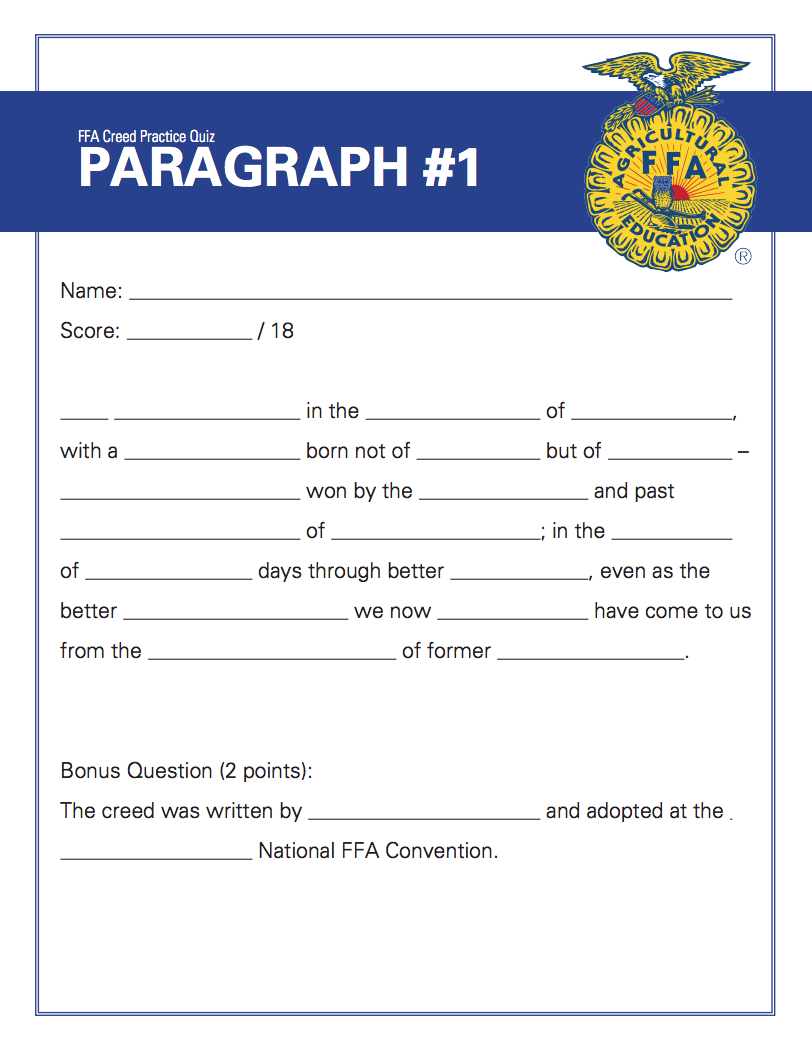Ffa Creed 4

The concept of a creed, in general, refers to a statement of belief or a set of principles that guide the actions and behaviors of individuals or groups. However, without specific context, it’s challenging to determine what “Ffa Creed 4” refers to, as it could be related to various organizations, beliefs, or even fantasy settings.
If we consider the FFA, which stands for Future Farmers of America, an organization that promotes agricultural education and leadership, the creed might be related to their mission and values. The FFA Creed, as stated by E.M. Tiffany in 1930 and revised over time, emphasizes the importance of agriculture, the value of hard work, and the belief in the promise of better days through scientific farming and the value of a well-rounded life.
However, if “Ffa Creed 4” refers to something specific within a fictional context, such as a role-playing game, book series, or another form of media, it could signify a set of principles, beliefs, or rules that govern the actions of characters or groups within that universe. Without more context, it’s difficult to provide a precise explanation.
Given the information provided and assuming a generic approach, let’s explore how creeds or sets of beliefs are formed and their significance in various contexts, including real-world organizations and fictional settings.
Formation and Significance of Creeds
Real-World Contexts: In real-world contexts, such as religious, political, or social organizations, creeds are often formed through a process of consensus among members or leaders. They serve as a guiding light for the organization’s mission, values, and future direction. Creeds can inspire loyalty, define identity, and give members a sense of belonging and purpose.
Fictional Contexts: In fictional settings, creeds can be used as a narrative device to add depth to characters, factions, or worlds. They can provide insight into the motivations, values, and histories of these entities, making them more believable and engaging for the audience. Fictional creeds can also serve as a commentary on real-world issues, allowing authors to explore complex themes in a safer, metaphorical space.
The Role of Creeds in Society and Fiction
Unity and Identity: Creeds can unify individuals under a common purpose or set of beliefs, whether in real-life organizations or fictional societies. This unity can foster cooperation, mutual support, and a shared sense of direction.
Guidance and Ethics: They often include ethical guidelines or principles that guide decision-making and action. This aspect is crucial in both real-world ethics and the moral development of characters in fiction.
Evolution and Adaptation: Creeds are not static; they can evolve as the needs, beliefs, and understanding of the organization or society change. This adaptability is essential for relevance and survival in both real and fictional contexts.
Symbolism and Ritual: Creeds can be embedded in rituals, ceremonies, or daily practices, serving as a powerful symbol of commitment and identity. This symbolic aspect can deepen the emotional and psychological connection individuals have with the creed and the community it represents.
Conclusion
Whether “Ffa Creed 4” refers to a real-world organization’s statement of beliefs or a fictional set of principles, understanding the role and significance of creeds in guiding actions, beliefs, and identities is crucial. Creeds reflect the values, aspirations, and ethical standards of their adherents, providing a foundation for community, purpose, and direction. As dynamic and evolving statements, they adapt to the changing needs and understanding of their proponents, ensuring relevance and continuity.